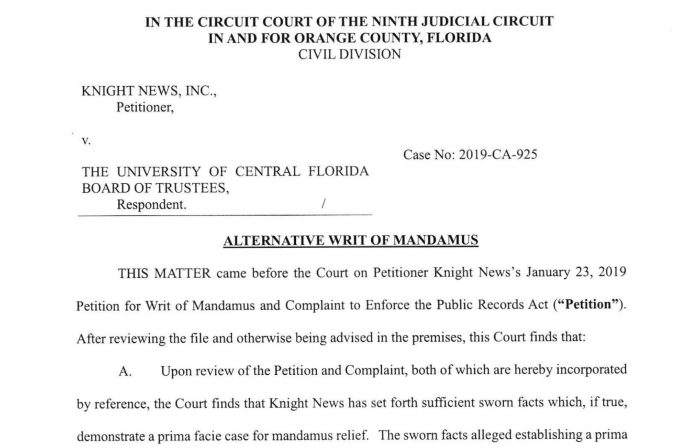Knight News secured its first court victory in the case against the University of Central Florida in a fight for public records.
UCF claimed to be missing audio of a key Board of Trustees vote on Colbourn Hall, the building at the center of an ongoing controversy of misused funds.
BREAKING COURT ORDER:
Knight News just secured its 1st major court victory in its lawsuit to force @UCFChairman & the rest of UCF’s Trustees to release audio of a critical committee vote in the #ColbournHallControversy.
A state official compared the missing audio to Watergate. pic.twitter.com/aFTb33y9KJ
— UCF Knight News (@UCFKnightNews) January 28, 2019
When Knight News made a ‘lawful request’ for any public record on September 25, 2018, identifying whether someone from the general counsel’s office was present during the board of trustees meeting where Trevor Colbourn Hall funding was approved, in addition to other records, UCF responded by claiming there were no responsive documents.
Knight News took the matter to court after identifying documents in the Bryan Cave report that may have satisfied the request. The court agreed, and ordered UCF to disclose the public records described below:
- Audio recording of the April 3, 2014 Finance and Facilities Committee meeting
- Minutes, if any, of the May 22, 2014 Board of Trustees meeting
- Audio recording, if any, of the May 22, 2014 Board of Trustees meeting
- Video recording, if any, of the May 22, 2014 Board of Trustees meeting
- Calendar entries, if any, from Vice President Scott Cole from two weeks before and after the date the Board of Trustees approved Trevor Colbourn Hall funding
- Any other public records in UCF’s custody that are responsive to Knight News’s September 25, 2018, public records request
If UCF does not disclose the records it must show cause why it shouldn’t within 10 days.
Knight News Sues UCF for Concealing Missing Audio, Other Records Involving Colbourn Hall
Highlights from a Florida House Committee discussing whether UCF’s investigation into the Colbourn Hall Controversy was sufficient:




